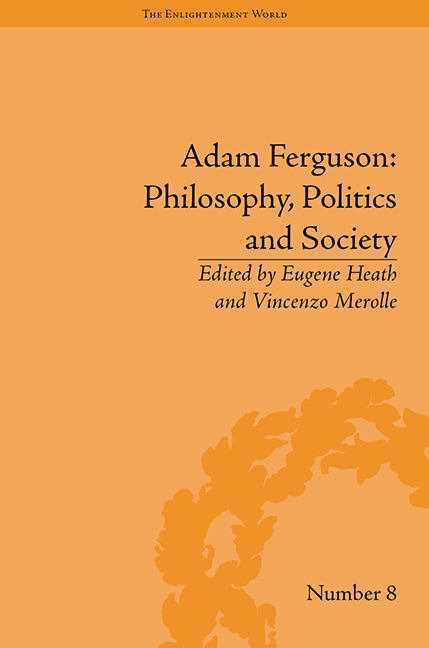Book contents
- Frontmatter
- CONTENTS
- Contributors
- Acknowledgements
- Introduction
- I Life and Works
- II Philosophy
- 3 Why Did David Hume Dislike Adam Ferguson's An Essay on the History of Civil Society?
- 4 Hume as Critic of Ferguson's Essay
- 5 The Two Adams: Ferguson and Smith on Sympathy and Sentiment
- III Politics
- IV Society
- Notes
- Works Cited
- Index
3 - Why Did David Hume Dislike Adam Ferguson's An Essay on the History of Civil Society?
from II - Philosophy
- Frontmatter
- CONTENTS
- Contributors
- Acknowledgements
- Introduction
- I Life and Works
- II Philosophy
- 3 Why Did David Hume Dislike Adam Ferguson's An Essay on the History of Civil Society?
- 4 Hume as Critic of Ferguson's Essay
- 5 The Two Adams: Ferguson and Smith on Sympathy and Sentiment
- III Politics
- IV Society
- Notes
- Works Cited
- Index
Summary
In a delightfully teasing letter to Adam Smith, Hume postponed informing him about the reception his Theory of Moral Sentiments (1759) was enjoying in London and predicting what its overall success would be by relaying gossip about various Scottish and French men of letters. Among other items, Hume told him that ‘Ferguson has very much polished and improved his Treatise on Refinement; and with some amendments it will make an admirable book, and discovers an elegant and a singular genius’.
Whatever became of Ferguson's Treatise on Refinement? The editor of the most recent edition of Ferguson's An Essay on the History of Civil Society suggests that it is ‘lost’. But perhaps it is more probable that the part of the early draft manuscript that Hume read, however slight it may have been, was incorporated into the published Essay, rather than being ‘lost’. When Hume came to read several sections of the penultimate or final manuscript of the Essay about eight years later, and more than a year before it was published, he told his intimate friend Dr Hugh Blair that he had high expectations for it, but they had been dashed by reading Ferguson's papers ‘more than once’. As he explained to Blair, his high expectations had been ‘founded on my good Opinion of [Ferguson], on a Small Specimen I had seen of them some years ago, and on yours & Dr Robertson's Esteem of them: But I am sorry to say it, they have no-wise answer'd my Expectation. I do not think them fit to be given to the Public, neither on account of the Style or Reasoning; the Form nor the Matter’. Hume here writes as if what he read in 1759 was part of what he tried to like later on in 1766 and 1767. It may even be that the ‘small specimen’ that he read and liked back in 1759 was, or included, the section ‘Of Luxury’ in Part VI of the Essay, which seems to echo Hume's own 1752 essay ‘Of Luxury’, which had been re-titled ‘Of Refinement in the Arts’ in 1760.
- Type
- Chapter
- Information
- Adam FergusonPhilosophy, Politics and Society, pp. 45 - 72Publisher: Pickering & ChattoFirst published in: 2014



